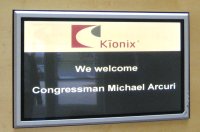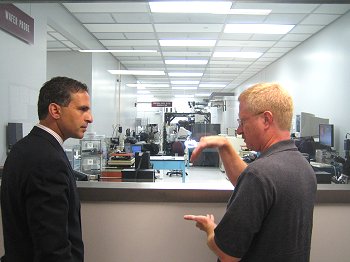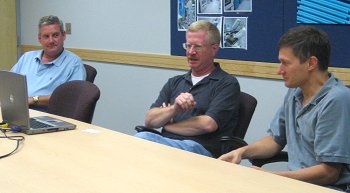- By Dan Veaner
- News
 Print
Print  U.S. Congressman Michael Arcuri was in Lansing Monday to learn about the global electronics market. Arcuri visited Kionix in the Cornell Business & Technology Park to talk to executives about their market, global competition, and what Congress can do to promote American business, as well as to tour the high tech facility.
U.S. Congressman Michael Arcuri was in Lansing Monday to learn about the global electronics market. Arcuri visited Kionix in the Cornell Business & Technology Park to talk to executives about their market, global competition, and what Congress can do to promote American business, as well as to tour the high tech facility."I've been to about 60 different businesses in the past year throughout the district," Arcuri says. "I think it's really important to find out what's going on, especially at a company like this that is doing such cutting edge, innovative things. So much of what they do is not just local, but international. I want to find out what affects them, how they affect the rest of the business climate, and what I can do to help."

Kionix CEO Gregory Galvin (right) explains silicon chip manufacturing
issues to Congressman Michael Arcuri on a tour of the high tech facility
Arcuri and two aids met with Kionix President and CEO Gregory Galvin, Executive Vice President and Chief Technical Officer Timothy Davis, and Executive Vice President and Chief Operating Officer James Kirkwood, and with Cayuga Venture Fund (CVF) Partner Jennifer Tegan. Arcuri asked questions about the cost of production, labor, and how the increase in fuel prices affects the electronics parts market.
"The unpleasant reality of the consumer electronics market is that end product prices continuously go down," Galvin told Arcuri. "As a consumer I love being able to buy a $600 laptop, but as a manufacturer of things that go into those kinds of products it's appalling that they're selling laptops for $600."
 Kionix executives (Left to right) James Kirkwood, Gregory Galvin, Timothy Davis |
Tegan told Arcuri about her company's involvement in providing capital for local startups. She noted that Kionix is CVF's second largest company, and that many of her firm's investments include startups that are currently developing prototypes for future products. "In Lansing in particular almost all the companies are in this business park," she said. "We are incredibly proud of what has happened in Tompkins County in terms of working with the University, commercializing technology and seeing it develop into good economic development for the area and the region."
Arcuri was especially interested in how competition from China affects Kionix sales, but Galvin said China is not a threatening competitor. He noted that you don't have to be a large corporation to compete in a niche market. "It's not always so obvious any more where it's cheaper," he explained. "When you start looking at transportation costs, the cost of logistics, as well as the fact that the wage rates around the world are going up. Taiwan, Korea, and Singapore are no longer low wage countries. Now it's Viet Nam, Thailand, and mainland China. But even if you look at China the wages in Shanghai have gone through the roof. It's a natural evolution that tends to level that playing field, at least in the technology industry."
Arcuri also asked about company growth and job creation, and specifically whether the company typically recruits from Cornell University. Galvin and Davis explained that while the original cadre of scientists did come from Cornell the specialists they need now are not necessarily young scientists right out of college. And Galvin noted that graduating seniors aren't interested in applying to smaller companies.
"The undergraduates in particular are very biased toward large companies," he told Arcuri. "They think startups are too risky. I point out to them that large company X just laid off 20,000 people, large company Y just laid off 40,000, and we keep hiring people."
Arcuri noted that there is a growing high tech region within his congressional district that is turning Central New York into a high tech corridor. "I like to try to see how they interconnect, how they fit in, and how we can use the synergy of companies like this to help bring more companies in," he says. "We're beginning to see it. It's happening naturally. It's not like government is doing anything. But we want to make sure the government doesn't get in the way. It needs to do anything that it can to help private companies like this continue to flourish."
 Arcuri looks at tiny 3 millimeter square chips. |
"We like to think of Kionics as a poster child for what's started to become a real model for this community," Tegan said. "If you drive around this park now there are a good number of technology companies that are in the early stages. These guys were truly one of the innovators when it came to being one of the true technology companies that got going in this area."
Arcuri asked the Kionix executives to contact him as legislation that might affect their market comes before Congress. Galvin takes a free market approach where government should step back and let companies compete. He and Arcuri both were wary of legislation that could have unintended consequences.
"I don't really look to the government as a source of help," Galvin says. "I think the Congressman's comment was the best, that government should not get in the way. Commerce should be profitable based on what they are selling or what service they're providing. They should be free to do that independently of the government."
That is especially necessary in the electronics market which has to be nimble in a market that is ever changing. "The product cycles tend to be that you develop a product and get it into the market and it will last nine to twelve months," Davis noted. "You have to be generating the next product. One of my struggles is that you can't look too far forward, because you miss the shorter term product trends and that will miss you a generation of products. It's very fast, but a little bit shortsighted. Because you don't know where the market is headed five years down the road."
Arcuri appeared impressed with the facility and amazed at how much the company can fit on a 3 x 3 x 0.9 millimeter chip. As executives showed him their tiny product he said he was afraid that one sneeze would blow them away.
"It was a good learning experience for me," he says. "We took away from this some of the things that I need to know in terms of helping them with respect to votes. That was why I said that when particular bills come up if there are any significant things you see on the horizon that I should know they should tell me so I can use the information as I form positions I take on bills."
----
v4i35



